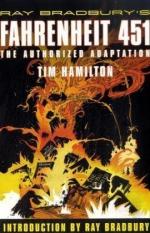|
This section contains 4,087 words (approx. 14 pages at 300 words per page) |

|
SOURCE: Dimeo, Steven. “Man and Apollo: Religion in Bradbury's Science Fiction.”1 In Ray Bradbury, edited by Martin Harry Greenberg and Joseph D. Olander, pp. 156-64. New York: Taplinger Publishing Co., 1980.
In the following essay, Dimeo maintains that religious concerns play a significant role in Bradbury's short fiction.
Although religious thinking in the space age has been largely dominated by Nietzschean apostasy, science fiction itself seems to be giving more and more attention to man's relationship with the divine.2 Religious themes have long been treated in the genre, but the first to give it serious—even literary—consideration was C. S. Lewis in his trilogy, Out of the Silent Planet (1938), Perelandra (1944), and That Hideous Strength (1945) which lofted the Christian mythology, complete with angels and devils, into tangible planetary realms. Since then the more notable examples of science fiction, with more innovative religious implications, have included Gore Vidal's Messiah (1954), James...
|
This section contains 4,087 words (approx. 14 pages at 300 words per page) |

|


